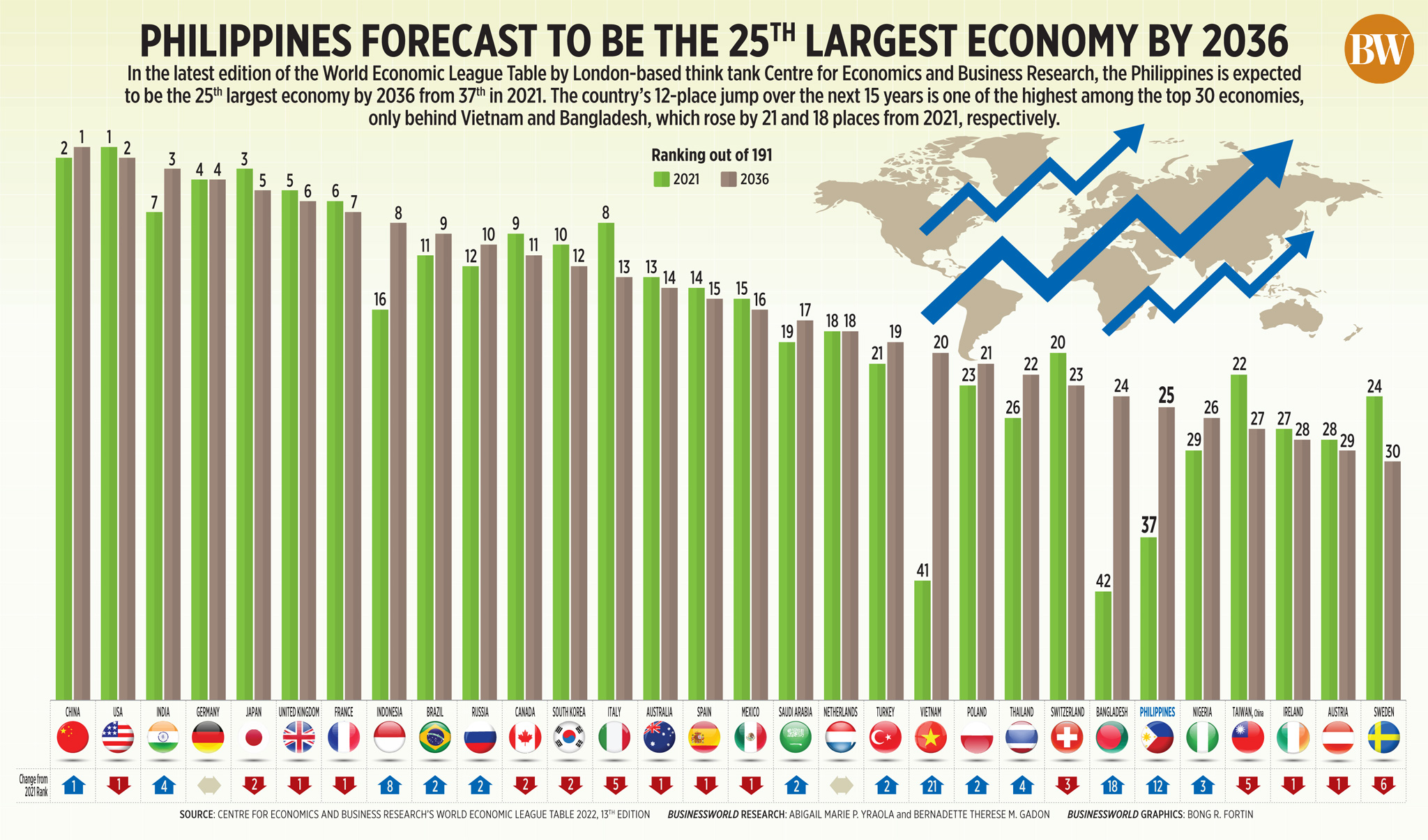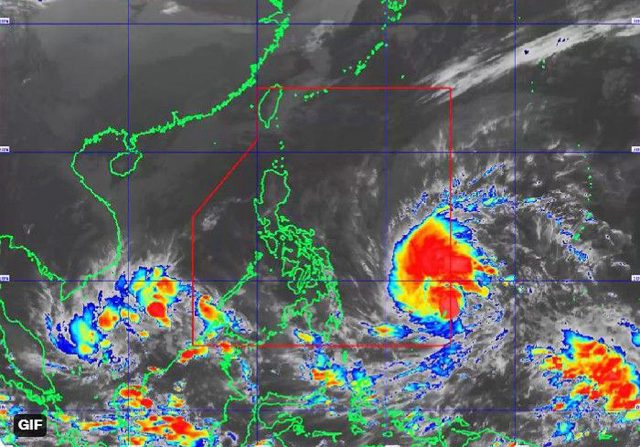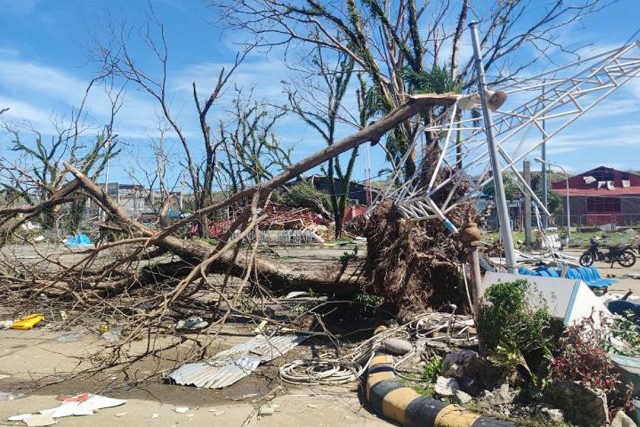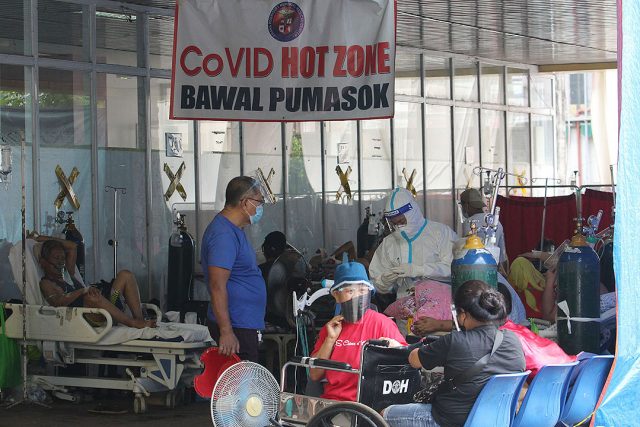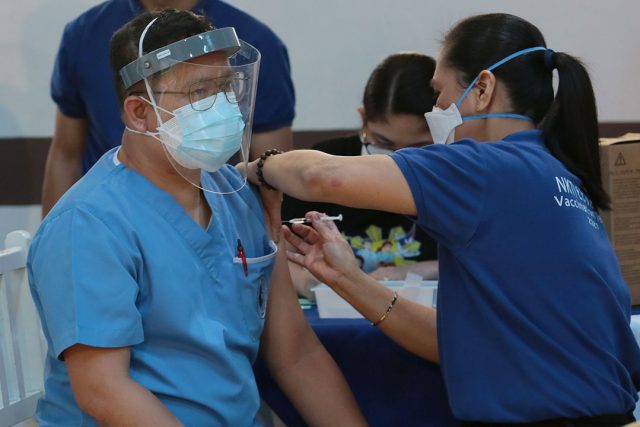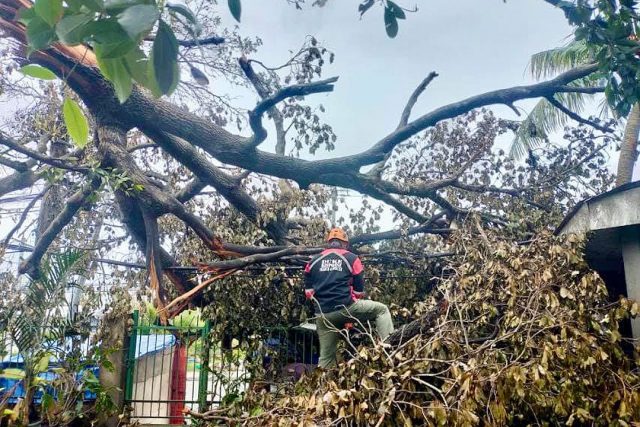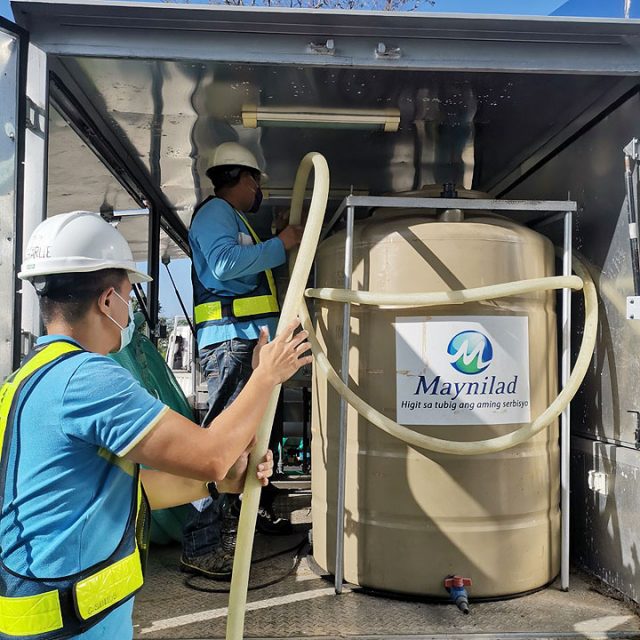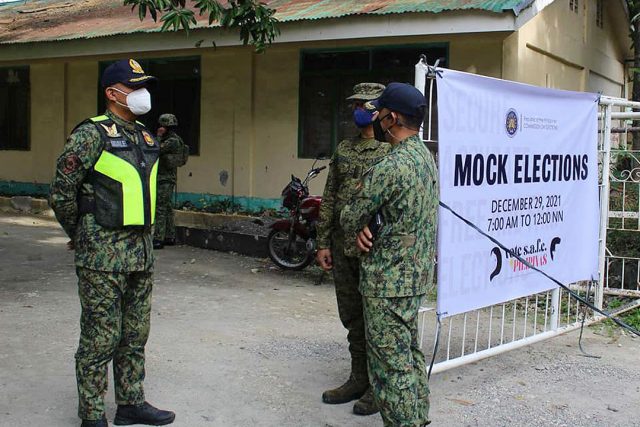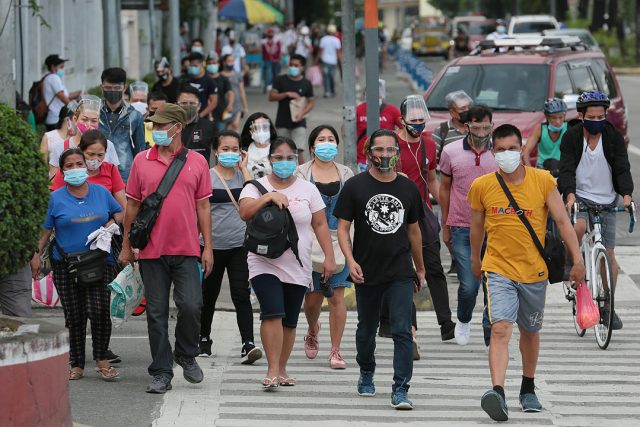Typhoon Odette cost to agriculture estimated at P8.4 billion
THE ESTIMATE of damage to agriculture done by Typhoon Odette (international name: Rai) has risen to P8.4 billion, the Department of Agriculture (DA) said.
The DA estimated the lost production at 175,720 metric tons, with 125,161 farmers and fishermen affected across 347,072 hectares.
Fisheries accounted for P2.8 billion of the estimated losses, affecting over 50,029 fisherfolk.
Losses to the rice crop were reckoned at P1.9 billion, with over 76,372 hectares affected. Coconut losses hit P1.5 billion across 211,630 hectares and sugarcane P1.2 billion over 51,159 hectares.
Losses of high-value crops like cacao, banana, and root crops were estimated at P315.4 million across 2,760 hectares while corn losses were P190.2 million over 5,150 hectares.
Separately, the Department of Agrarian Reform (DAR) said it will give typhoon victims priority in the distribution of unused government-owned land (GOL).
Agrarian Reform Secretary Bernie F. Cruz said in a statement that all unused GOL and private agricultural land could be immediately distributed to potential agrarian reform beneficiaries in storm-hit provinces.
“As per the directive of the President, all regional directors are directed to submit a consolidated list of all unused GOL inventory of the Field Operations Office and private agricultural lands to the Office of the Secretary, copy furnished the Offices of the Undersecretaries for Field Operations and Policy, Planning and Research on or before Jan. 10, 2022 for distribution in the first quarter of 2022,” Mr. Cruz said.
The DAR said it would expedite the acquisition and distribution of land to be completed in three months, or until the first quarter of 2022.
The Aboitiz Group, through the Aboitiz Foundation, Inc., said it has mobilized its units to send aid to typhoon victims in the Visayas and Mindanao.
The foundation allocated around P15 million for the distribution of relief goods and deployed over 500 linemen to restore power in Cebu, Surigao del Norte, and other affected communities.
“Providing immediate needs to the communities has been our priority in our relief efforts through our ‘Bangon VisMin’ initiative… the foundation will continue to provide relief and support rebuilding efforts true to our promise of advancing business and communities, said Aboitiz Foundation President Maribeth L. Marasigan in a press release.
Operations were assisted by the Army Reserve Command and the Philippine Air Force Civil Military Operations Group. — Luisa Maria Jacinta C. Jocson
DPWH reckons damage to public infra at P1.2B
THE Department of Public Works and Highways (DPWH) said damage caused by Typhoon Odette (international name: Rai) to public infrastructure amounted to P1.2 billion so far.
Public Works and Highways Secretary Roger G. Mercado said in a radio interview on Thursday that further assessment is ongoing for the Dinagat Islands and Siargao.
“At present, the damage estimate is at P1.2 billion destroyed roads, bridges, sea walls, and other flood control projects,” Mr. Mercado said.
“There are island municipalities in Dinagat Islands and Siargao that are (remote). There are ongoing efforts to reach these areas… to assess the damage there,” he added.
He said the DPWH is focused on providing assistance in areas heavily damaged by Odette such as Dinagat Islands, Cebu, Siargao, and Southern Leyte.
Mr. Mercado said that all national highways are currently passable following the damage caused by the typhoon.
He added that all affected infrastructure has been fixed temporarily to allow the distribution of relief goods and the passage of vehicles.
“As of now, roads across the country are already passable to everyone. Even the last one which was washed out in Cebu, the Barili-Toledo Road, is now passable to all vehicles,” Mr. Mercado said. — Revin Mikhael D. Ochave
DENR urged to rethink ban on coastal settlement
THE Environment department’s plan to prevent residents from resettling along the coast in Siargao threatens to deprive thousands of their livelihood, nongovernment organizations said.
The plan by the Department of Environment and Natural Resources (DENR) needs to be reconsidered because relocation does not guarantee safety, Youth Advocates for Climate Action Philippines (YACAP) said.
“Relocation is not necessarily the best and only way. The current administration can implement people-focused policies,” YACAP said in a statement.
“Relocating them somewhere else… is easier said than done. The coastal communities of Siargao are not simply returning to their houses, but also their livelihoods and source of income,” the group said, adding that if they are relocated without consideration for their future earning potential, the outcomes will be negative.
Gabriela Women’s party-list Rep. Arlene D. Brosas said the DENR should take into consideration the rights of fisherfolk who rely on access to the waters.
“If giving them a bit of aid, tarpaulins, and wood from coconut trees is your plan for those who were affected, you don’t have the right to dictate where they should be living,” Ms. Brosas said.
Environment Undersecretary Benny D. Antiporda said on Tuesday that coastal residents of Siargao will no longer be permitted to return to their homes.
The DENR said it will work with local government units (LGUs) to identify qualified tenured residents who will be given land away from the sea for their safety.
“This will be settled as soon as possible, for now, the LGUs were instructed to look for a temporary resettlement area,” Mr. Antiporda told BusinessWorld in a Viber message.
Terezo Ravelo, the barangay captain of Caridad in the Siargao municipality of Pilar, said on video that “We have no homes to come back to” after the storm surge swept over the seaside village.
Typhoon Odette first made landfall in Siargao on Dec. 16, where 447 families have been sent to public schools and government facilities serving as evacuation centers.
Mr. Ravelo said residents are returning to their destroyed homes and living in makeshift shelters, periodically returning to evacuation centers whenever it rains.
Mr. Antiporda said typhoon victims will need to prove they have resided in coastal communities for at least five years to be eligible for a Protected Area Community-Based Resource Management Agreement, applications for which will be processed by LGUs and the DENR.
President Rodrigo R. Duterte has said of relocation plans: “If it’s government land, give everything. Better give it to the people.” — Marielle C. Lucenio
Gov’t keeps second alert level after infection uptick
THE PHILIPPINES will remain under Alert Level 2 until Jan. 15 after a slight rise in coronavirus infections, according to health authorities, and amid the threat of a more infectious Omicron variant.
An inter-agency task force approved a plan to keep all provinces and highly urbanized cities under the second alert level from Jan. 1 to 15, Cabinet Secretary Karlo Nograles said in a statement on Thursday.
Under the lockdown level, businesses may operate at 50% capacity indoors, limited to fully vaccinated customers.
The country’s coronavirus situation was “very stable,” vaccine czar Carlito G. Galvez, Jr. Said this week, even as he noted increased infections in some areas.
The Philippines has detected at least four cases of the Omicron variant, which has spurred a fresh infection surge in some countries including the United States.
Almost 50 million out of 109 million Filipinos have been fully vaccinated. The government is targeting to inoculate 54 million people by yearend.
The government task force also updated its country risk classification. Red-listed countries, considered to be high risk for the coronavirus, included Eswatini, Lesotho, Malawi, Mozambique, Namibia and Spain.
Vaccinated passengers who come from these territories must get quarantined at a state-approved facility upon arrival and until their RT-PCR tests, which will be taken on the seventh day, are released. Unvaccinated passengers will get tested on the 10th day.
The Department of Health (DoH) reported 1,623 coronavirus infections on Thursday, the highest in more than a month, bringing the total to 2.84 million.
The death toll hit 51, 373 after 133 more patients died, while recoveries increased by 256 to 2.78 million, it said in a bulletin.
There were 11,772 active cases, 577 of which did not show symptoms, 5,737 were mild, 3,315 were moderate, 1,771 were severe and 372 were critical.
The agency said 97% of the reported cases occurred from Dec. 17 to 30. The top regions with cases in the past two weeks were Metro Manila with 1,063 infections, Calabarzon with 173 and Central Luzon with 101.
It said 3% of the reported deaths occurred in December, 5% in November, 11% in October and 15% in September.
DoH said 10 cases had been removed from the tally, six of which relisted as recoveries. It added that 143 people had tested negative and were removed from the tally, with 140 relisted as recoveries.
It also said 126 cases tagged as recoveries were reclassified as deaths. Two laboratories did not operate on Dec. 28, while one failed to submit data.
The agency said 20% of intensive care units in the Philippines were occupied, while the rate for Metro Manila was 24%.
Meanwhile, DoH said it was investigating reports that some people who came home recently from overseas had skipped quarantine. “Now is not the time to relax and deliberately put others in danger,” it said in a separate statement.
“All agencies involved are currently meeting and we will release information once complete,” it told reporters in a Viber group message. “Rest assured contact tracing has commenced.”
DoH said failure to observe quarantine rules is against the law and violators will face penalties.
Keeping cases and hospital admissions low needs everybody’s cooperation, it said. The public should report people, businesses and local governments that violate health protocols, it added.
“This blatant disregard of health protocols should not be tolerated and should be punished, regardless of who they may be,” Senator Juan Miguel F. Zubiri told reporters in a Viber group message.
He said he had heard of someone who had the coronavirus skipping quarantine to attend a party, adding that her friends were not positive.
“This is irresponsible, illegal and unforgivable,” he said. “Dozens are now sick and some even hospitalized, possibly with the Omicron strain.”
“The COVID crisis will not end if there are individuals like this and facilities who do not care for the proper implementation of our quarantine protocols,” Mr. Zubiri said in Filipino, adding that authorities should investigate the matter. — Alyssa Nicole O. Tan and Norman P. Aquino
Congressman: People failed to get booster shots from Veterans
VETERANS Memorial Medical Center (VMMC) in Quezon City had to turn people away for booster shots against the coronavirus after running out of supply, according to a congressman.
In a statement on Thursday, Party-list Rep. Michael T. Defensor urged Health Secretary Francisco T. Duque III and vaccine czar Carlito G. Galvez, Jr. to ensure there is enough vaccine supply in Quezon City and other parts of the country.
“Hundreds, perhaps thousands, who waited for at least a week for their turn to receive their boosters showed up at VMMC on North Avenue, but had to go home frustrated because there was no vaccine,” he said, citing complaints from his constituents.
The government is under pressure to provide booster shots against the coronavirus amid the threat of the highly mutated Omicron variant, which has caused a fresh surge in infections in some countries.
Mr. Defensor noted that out of 209 million vaccine doses that have arrived in the country, only 107.3 million have been given out “That means we have a comfortable extra supply. So where is it?”
Health Secretary Francisco T. Duque III said VMMC received 67,000 vaccine doses before Dec. 25 but it never asked for a refill.
“The standard operating procedure is that a replenishment in the supply of vaccines is automatic once it reaches a critical level and not zero,” he said in a mobile phone message on Thursday.
VMMC was set up in 1955 with full US government assistance under the US Veterans Administration to provide hospitalization and treatment to Filipino veterans under the US public law.
It originally catered to patients who suffered from service-connected disabilities, recognized guerrilla units, Philippine scouts and Philippine Commonwealth Army. It later extended its service to former Philippine soldiers and their dependents.
The Department of Health (DoH) had been unable to help VMMC get more vaccines because it had not updated its vaccine report, Mr. Duque said, citing a DoH representative from Quezon City.
Mr. Defensor said the hospital had been turning away hundreds of walk-ins due to lack of vaccine and personnel, accepting only those who pre-registered for booster shots. “But on Wednesday, there was no vaccine even for those who registered last week for their booster shots.”
The lawmaker added that since the hospital required pre-registration, it could have assessed the number of booster shots it needed.
“I hope they come up with a better system next time, from pre-registration to queuing up and screening at the vaccination center up to injection and post-injection monitoring,” the congressman said.
DoH has said that effective Dec. 22, fully vaccinated adults could get a single-dose booster of COVID-19 vaccine at least three months after the second dose of AstraZeneca, Moderna, Pfizer, Sinovac or Sputnik vaccine, or at least two months after a Janssen shot.
A booster is an additional vaccine dose given after the protection mounted by initial doses starts to wane. Boosters are said to reinforce protection against severe COVID-19 outcomes especially for the elderly and seriously ill people.
The US record for daily coronavirus cases has been broken as two highly contagious variants — Delta and Omicron — have converged to disrupt holiday travel and gatherings, deplete hospital staffs and plunge the United States into another long winter, The New York Times reported.
The seven-day average of US cases topped 267,000 on Tuesday. The milestone was reached after rules were relaxed in the spring to a Delta-driven summer wave to another surge that accelerated with astonishing speed as Omicron emerged after Thanksgiving, it said. — Jaspearl Emerald G. Tan
Cebu to provide P5M per town for rebuilding of typhoon-hit houses
THE LOCAL government of Cebu, ranked as the richest province in the country, will be distributing P5 million to each city and municipality for the rebuilding of houses hit by typhoon Odette, internationally known as Rai.
Cebu Governor Gwendolyn F. Garcia, who has been making the rounds of the province since last week, ordered mayors to prioritize residents’ shelter needs over repairs on public buildings.
Ms. Garcia, in a statement on Tuesday, said the province has enough funds for the relief and recovery efforts and will not be requesting special financial assistance from the national government outside what will be allocated under the emergency budget for affected regions.
“We will not demand (from the national government) since we are (financially) capable,” she said in Visayan.
The governor added that she recognizes that many other affected provinces would require the help.
Cebu was the richest province in 2020 with P208.27 billion in net assets, keeping the top spot from P203.9 billion in 2019, based on the latest Commission on Audit annual financial report on local governments. The province is also debt-free.
Ms. Garcia earlier said that “the distinction of being the richest province must be felt by Cebuanos through projects and programs that would have an impact on their lives, such as good infrastructure, among others.”
Cebu City, the province’s capital and commercial hub, along with the cities of Lapu-Lapu and Mandaue are independent units that are not under the provincial government’s administrative authority.
Cebu province, composed of the mainland and over 167 islands, covers 44 municipalities and six cities.
RADIO COMMUNICATION
For next year’s budget, funds will be allocated for radio communication facilities across the province.
The governor said “Odette taught her the importance of going back to basics.”
She said the provincial government will set up a radio base in every local unit and police station to ensure continued contact when commercial telecommunication services are affected by natural events. — MSJ
Maynilad sending mobile water treatment plants to Cebu, Bohol
MAYNILAD Water Services, Inc., the Metro Manila west zone water supplier, is deploying mobile water treatment plants in Cebu and Bohol, two of the provinces affected by typhoon Odette, internationally known as Rai.
Each mobile equipment, capable of processing water from rivers or floodwater, can produce 43,000 gallons per day, enough to meet the drinking water requirement of 80,000 people, the company said in a statement on Thursday.
Maynilad also said it earlier donated P6.5 million cash aid for typhoon survivors through the Philippine Disaster Resilience Foundation and One Meralco Foundation. It also sent around 10,000 bottled water to the provinces of Cebu, Bohol, Palawan and Surigao del Norte.
“We are sending potable water to address the immediate need for it, but we will also extend sustainable support so these provinces can work toward full rehabilitation,” Maynilad President and Chief Executive Officer Ramoncito S. Fernandez said.
Metro Pacific Investments Corp., which has a majority stake in Maynilad, is one of three Philippine units of Hong Kong-based First Pacific Co. Ltd., the others being Philex Mining Corp. and PLDT, Inc.
Hastings Holdings, Inc., a unit of PLDT Beneficial Trust Fund subsidiary MediaQuest Holdings, Inc., has an interest in BusinessWorld through the Philippine Star Group, which it controls.
Comelec to revise guidelines on voting procedures after mock elections outcome
THE COMMISSION on Elections (Comelec) will revise its voting procedures for the May 2022 polls to address issues that were observed during the mock elections held Wednesday in several areas across the country.
Among the problems encountered involved technical matters relating to ballots to vote counting machines as well as ensuring the observance of health protocols such as distancing.
“The Comelec will discuss that (maintaining distance at voting lines). We will come up with protocols or guidelines on how to address that problem,” Comelec Director Eliza Sabille-David said in Filipino in an interview Thursday with government-run PTV.
She also said that the commission would need to address potential crowding at the voting sites. — Jaspearl Emerald G. Tan
Rizal in 3D-print
A STATUE of the Philippine’s national hero, titled Dr. Jose P. Rizal, The Filipino Scientist, made using 3D printing was unveiled on Dec. 30 at the Department of Science and Technology (DoST) complex in Bicutan, Taguig as the country observed his 125th year of martyrdom.
PHL in 2022: Need for a new social contract
Why we need a new social contract in the Philippines should not be trick question. True, in theory, it could be as fundamental as reiterating that the people are the only source of government power, that the people can withhold granting such power to the government because they have the ability to do so. To what extent should the people exercise their individual rights as to constitute popular sovereignty rounds out the conversation.
These premises rationalize the role of government in protecting the people and in promoting their well-being. If the government, for any reason, fails to uphold the rule of law and frustrates the cause of truth and justice, freedom and equality, love and peace, the people can exercise their power within the bounds of the law to ensure that our ideals and aspirations in the Philippine Constitution are always upheld.
However, rewriting the social contract is now imperative because of the sea changes in the policy environment. With the so-called pandemic of disinformation, for instance, it is necessary to define the rights and obligations of Filipinos in seeking the truth as the basis of both state policy and action, and their own defense against the opposite of truth. Digitalization of business activities also ought to lead to a rethink of social obligations and the government’s role in delivering public goods. Moreover, corruption involving public money has become an enduring culture, now more pronounced in a time of pandemic and a spate of natural calamities.
Precisely three years ago, the International Monetary Fund (IMF) and the London School of Economics (LSE) jointly sponsored a workshop on “Social Protection in a Changing World.” The Fund was looking into strategic ways of shaping more relevant social spending in member countries. LSE had decided to prioritize its research on welfare provision. The nexus between the two institutions and their goals could not be clearer. Social spending is crucial in promoting more inclusive and sustainable economic growth and financial stability. In the workshop, the issue was immediately elevated to one of rewriting the social contract by LSE’s director Minouche Shafik by pointing out that while social safety nets have been beneficial, constraints on public spending, high levels of inequality, economic slowdown, and fears about the rapid technological change have exacerbated social discontent, leading to the rise of populism.
What Shafik proposed was that the new social contract should reinstate reciprocity and insurance elements of a social safety net, mitigate any imbalance in labor and capital taxation, consider “predistribution” measures like wage floors, investments in education and health, enhance social mobility and more effective rollout of infrastructure.
World Bank’s Michal Rutkowski, Harvard’s Jeni Klugman, and LSE’s Nick Barr and Ian Gough made an interesting point about the contemporary aspect of climate change. “Climate change, and climate-induced migration introduce new requirements for policies to be not just economically but also environmentally sustainable, and highlighted new needs for protection.” This would also warrant a rethink of the social contract.
In the Fund’s Finance and Development of December 2018, Shafik discussed anew the need for a new social contract. People are unhappy because of inequality, aggravated by the concern about the consequences of automation and population aging. Inequality was observed to have improved among countries but worsened within those countries. It was correct for Shafik to argue that while globalization and technology have their own share of blame, the greater blame should be on the failure of the social contract, and we suggest on the political leaders, too, “to manage properly the consequences of both.”
Thus were protectionism and anti-immigration sentiment born. But as Shafik reasoned, “the answer is not to deglobalize and revert to our national silos, but to rethink our social contract to heal these tensions and help people adjust.” What made matters worse is the coincidence of globalization, the financial crisis of 2008 and the ensuing financial squeeze that brought about poverty, inequality with a weak social safety net as mitigant. This would explain how a Donald Trump could win in the polls, or perhaps populist strong men becoming electoral darlings despite a slide to authoritarianism.
This is the global context of a possible rewriting of the social contract in nation states.
Going back to the Philippines, it would therefore be ideal for the new leader to announce the proposal to develop and implement a new social contract that would be explicit, for instance, in how workers displaced by modern technology and automation would be assisted by the government. The social contract should also ensure that the interest of special groups is promoted in the face of recent economic and social developments. We have a law giving some benefits to senior citizens, but we need a more systematic articulation of how the state intends to provide healthcare to them, even in providing health insurance and other pre-need coverage. A social contract mitigates marginalization in society.
Inequality is another challenge to a new social contract. Pre-distribution policies are definitely game changers. Good education, increased social mobility, and infrastructure development all lead to more robust economic growth. Quality education over time benefits from high payoff and inspire confidence in the future of the system. More flexible movement of people enabled by a good transport network and spatial location of firms allows better job matching and higher productivity. Infrastructure supports more sustainable growth in the future.
It is imperative to correct structural rigidities like the lack of flexibility in hiring and firing workers as the economy undergoes changes. This would have to be matched by generous unemployment benefits, training, and job placement. Shafik quoted a Danish practice of “flexicurity.” Firms pay higher taxes with a compensatory flexibility in labor practices.
In reconstructing the social contract, the people’s buy-in is key.
Who can argue against the cause of meaningful electoral reforms so that the will of the people may be freely expressed through the ballot? The social contract should redefine and address any new impediment to this cause.
Who can argue against the rule of law in people’s affairs in relation to any agency of their government? What other kind of recourse do the people have when the Constitution and the system of laws are transgressed openly?
Who can argue against the cause of upholding the country’s sovereignty as a nation? How else do we preserve our democratic rights as a nation if we allow aliens to eat into our own territories?
Who can argue against strengthening our public health system and quality education as we chart our destiny into the new year, and beyond? The pandemic has more than demonstrated the weaknesses of both institutions and government neglect even as they are both guaranteed by the Constitution.
Who can argue against promoting sustainable and inclusive economic growth that empowers even the marginalized sector to participate in business activities to help build the nation? Alienation and social strife develop when economic growth is not only feeble but also exclusivist.
Who can argue against strengthening communities that are resilient to both a health pandemic and climate change? It is not enough to subject health and climate issues to public discourse, they should be funded, and funded well.
A new year is like a new wineskin ready to accommodate a new wine of pure energy and new visions, and the past year is good only for remembering the tragedies we should avoid and the gains we should fight for.
The Lord will bless us and keep us all in 2022, and beyond!
Diwa C. Guinigundo is the former deputy governor for the Monetary and Economics Sector, the Bangko Sentral ng Pilipinas (BSP). He served the BSP for 41 years. In 2001-2003, he was alternate executive director at the International Monetary Fund in Washington, DC. He is the senior pastor of the Fullness of Christ International Ministries in Mandaluyong.
DENR sees lifting of open-pit ban not hindering measures to deter illegal mining
THE Department of Environment and Natural Resources (DENR) said the recent lifting of a ban on open-pit mining is not expected to hinder the department’s efforts in deterring illegal mining activity.
“The lifting of the open-pit ban does not… result in more illegal miners because their areas are separate from that of the large-scale miners,” Director of Mines and Geosciences Bureau (MGB) Wilfredo G. Moncano said in a text message.
On Dec. 23, Department Administrative Order (DAO) 2021-40 lifted the four-year ban. This supersedes DAO 2017-10, issued by the late DENR Secretary Regina L. Lopez, which had banned the open-pit method of mining for copper, gold, silver and complex ores.
DAO 2017-10 contended that “most, if not all, open pits have ended up as perpetual liabilities, causing adverse impacts on the environment, particularly due to the generation of acidic and/or heavy metal-laden water, erosion of mine waste dumps and/or vulnerability of tailings dam to geological hazards.”
Mr. Moncano said the DENR is working to ensure the closure of all small-scale illegal mines.
“The MGB-DENR has addressed this issue via a program on the Expeditious Approval of Declaration of Minahang Bayan (MB), coupled with the formalization of small-scale miners and small-scale mineral processors,” Mr. Moncano said. “In 2016, there were only six Minahang Bayan or People’s Small-Scale Mining Areas approved but now we have 49 all over the country, and about 50% of them are in Mindanao. But there are still more than a hundred MB applications pending.”
“If these small-scale miners are inside approved MPSA and the MPSA holder does not give consent to the MB in its MPSA, the “Big Brother-Small Brother” set up also can be employed. The MPSA holder is the big brother who will help monitor them and implement safety and environmental practices at the same time buying the small-scale miner’s production,” he added.
In a statement, the MGB announced that it issued 144 cease and desist orders against violators of the Philippine Mining Act of 1995, exceeding by 240% its original target of 59 orders.
“In our heightened campaign for responsible mining in the country, we are proud of our milestone in cracking down illegal and irresponsible use of our mining resources and areas beyond the target we have set,” Secretary Roy A. Cimatu said.
The bureau also exceeded its target for mining permits and contracts, with a total of 4,526 permits, agreements, or ore transport certifications.
“The MGB expects to have more permits and contracts issued because of this new policy development,” Mr. Moncano said.
“The increase in the issuance of mining permits and contracts will compel mining companies and entities to abide by environmental laws, policies, and regulations, thus, making our mining sector more responsible,” Mr. Cimatu added.
The Department of Finance (DoF) said it supported the lifting of the ban, noting that the government has the capacity to enforce regulations to minimize the impact on the environment.
In a statement on Thursday, Finance Secretary Carlos G. Dominguez III said: “I am confident that the DENR is fully capable of regulating mining operations in the country so that mining activities are conducted safely with due regard to the protection of the environment.”
“Strict monitoring and enforcement to ensure compliance with environmental standards shall be undertaken to prevent any abuse in the implementation of this type of mining activity,” he added.
The DoF said that with the return of open-pit mining, the industry must be mindful of the impact of its activities on the environment.
“The protection of the environment is nonnegotiable. We have to strike a careful balance between preserving and protecting the environment and pursuing our economic development objectives,” Mr. Dominguez said.
The DoF also said that the lifting of the ban will help revitalize the economy as it recovers from the pandemic, by generating additional revenue, royalty fees, exports, and jobs.
“The mining industry can become a key contributor to the nation’s economic recovery as the DENR has projected that open-pit mining will lead to the immediate development of 11 pending projects that are expected to generate about P11 billion combined in yearly government revenue, increase annual exports by P36 billion and provide employment to 22,880 people living in remote municipalities,” Mr. Dominguez said.
“These economic prospects can still be realized while we continuously implement strategies to manage and avoid the negative impacts of the open-pit mining method,” he added.
Environmental organizations and political parties expressed their opposition to the lifting of the ban. Bayan Muna Rep. Eufemia C. Cullamat said the return of open-pit mining will negatively affect the environment and indigenous tribes.
“Sa gitna ng krisis sa klima at mga tumitinding bagyo, lalong lalala ang epekto ng mga sakuna sa mamamayan sa pagtanggal ng ban na ito. Tiyak na magdudulot din ito ng mas matinding panunupil at malawakang pagpapalayas sa mga katutubo mula sa lupang ninuno (As we endure the climate crisis, which features stronger typhoons, people will be put in greater danger with the lifting of the ban. This is sure to result in the oppression and eviction of indigenous peoples from their native land),” Ms. Cullamat said in a statement. — Luisa Maria Jacinta C. Jocson


